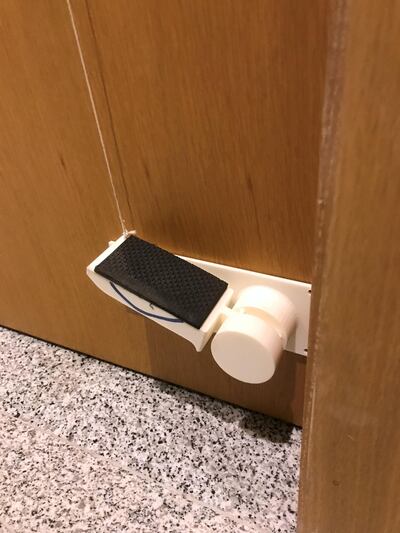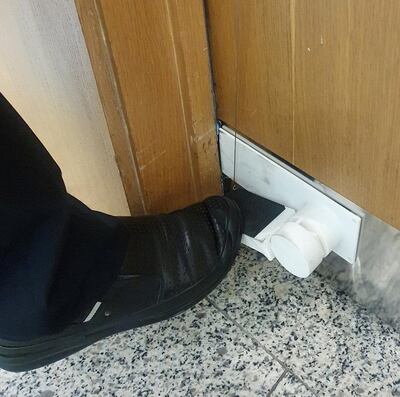Wearing a mask may be the greatest form of protection against the spread of Covid-19, but the virus can also be transmitted from contaminated surfaces.
While the World Health Organisation recommends frequently cleaning and disinfecting surfaces that are touched regularly – from door handles to screens – a design team at NYU Abu Dhabi is changing the way people enter and exit rooms to get a handle on the situation.
The team have invented a device that facilitates using one’s foot, as opposed to one’s hands, to open doors. Development started last summer when researchers were barred from conducting experiments on campus as part of the university’s response to the pandemic.

“My researchers were not allowed to go to the lab. After a few weeks of being completely shut out, we managed to convince leadership to give partial access to a few researchers,” says Mohammad Qasaimeh, assistant professor of mechanical and biomedical engineering at NYU Abu Dhabi.
“However, there were biologists doing experiments on Covid-19 patient samples in the same building, so people were very concerned about going into that building and touching doors.”
Bisan Samara, a former research assistant with Qasaimeh, saw this as an opportunity to solve the problem using a simple mechanical solution. The two came up with a pivot and lever that can be attached to doors and operated using your foot. It consists of only two parts: a rectangular white base and a cord.
“We have a nice campus and the property management company does not want us to change anything in the architecture, so drilling into doors was not an option. Consequently, we ended up 3D-printing the mechanical parts and using double-sided tape to attach the base to the door, while the cord attaches to the door handle. That’s it. It’s like a high school project,” says Qasaimeh.
The simplicity of the system is what Qasaimeh is most proud of. "That's the whole point," he says. "We develop miniature devices in biomedical engineering for point-of-care diagnostics, but this is exactly the opposite – not sophisticated, just useful."
The nameless contraption is installed on nine doors around the university, including at the Welcome Centre, two lab doors and a few staff offices. Thanks to rapid prototyping done in-house by Dr Oraib Al Ketan, a research instrumentation scientist at NYU Abu Dhabi, the team was able to install and test the system quickly. Early feedback from users has also led to small improvements.
Using the lever to push the door open with one foot is fairly easy, but pulling a door open while balancing on one foot can be a bit tricky. To help facilitate this action on heavier doors, the hinges were softened making them easier to manoeuvre with one foot.
Additional feedback pointed to self-preservation and maybe a twinge of vanity, so rubber padding has been added to the panel to reduce the likelihood of damaging one’s foot and expensive shoes.
The team also identified other potential design flaws that they are working to correct. For example, there is a concern that double-sided tape may fail if attached to outside doors in extreme heat. Matilde Handal, an undergraduate mechanical engineering student, is modifying the design to improve user experience as part of her capstone project under Qasaimeh's supervision.
With regard to the future of this innovation, two ideas are in play: one is to patent and commercialise it and the other is to make the 3D design available on the internet for free. Qasaimeh explains how this final decision presents the only circumstance where simplicity is not completely favoured.
“It’s such a simple mechanical system that it is not easy to patent because there are many similar systems out there, albeit not specifically for foot-operated doors. It’s like people were using this system in 200 BC, right?
“We are leaning towards releasing it for free for the good of humanity and to prove the point that simplicity is key. We are not introducing rocket science here, but I have not touched the door handle for my office in eight months, so it’s a solution that is working.”


